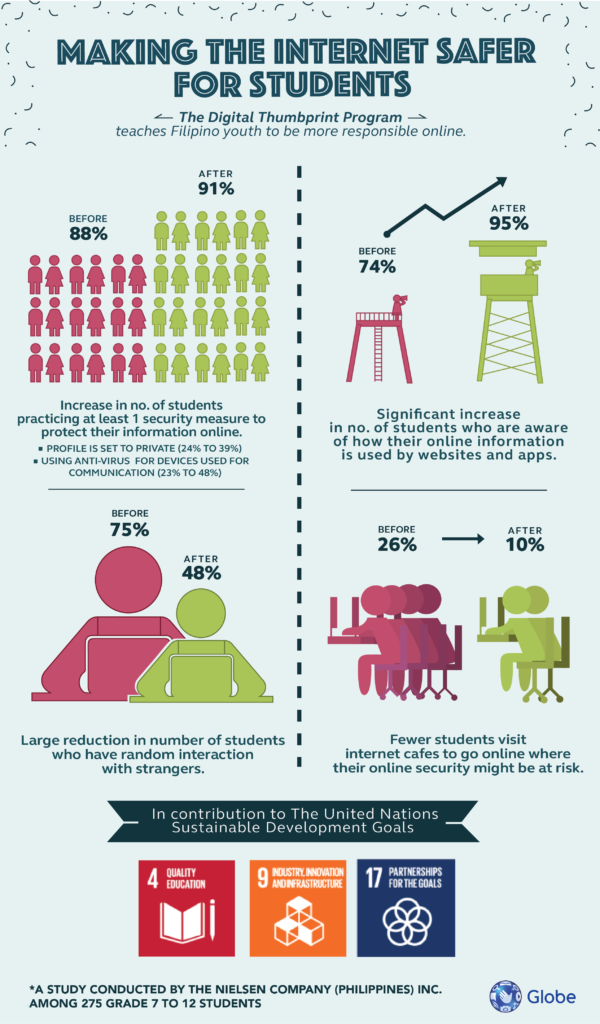Students have shown positive changes in cyber safety behavior after taking up Globe Telecom’s Digital Thumbprint Program, according to a recent study made by the Nielsen Company.
DTP, which Globe conducts in partnership with Facebook and the Department of Education (DepEd), provides students with insights into how the online world operates, how to be responsible online, and how to make the most of the internet in a positive way.
“It is our aim for students participating in DTP to leave the program with the belief they can effectively manage the challenges involved in being a good digital citizen. This is part of our long-term efforts in educating and protecting the youth on the impact of technology in their lives as we help build the Philippines into becoming a digital nation,” said Yoly Crisanto, Chief Sustainability Officer and Senior Vice President for Corporate Communications at Globe.
Globe has commissioned Nielsen to test whether DTP would lead to increased levels of digital citizenship awareness among students. Nielsen measured the responses of 275 Grade 7-12 students who studied three of the four modules of the program – Digital Insight, Digital Impact, and Digital Ambition.
Based on the study, DTP has led to an increase from 74% to 95% in the number of students’ who are now aware on how personal data in cyberspace is used by third parties such as social media sites, advertisers, and other companies.
This prompted more participants to take steps to keep their online information safe and secure, with 39% setting their profile to private vis-à-vis 24% before DTP and 48% using anti-virus protection for communication devices compared to the previous level of 23%.
The number of students engaging in group chats or messages with strangers online have also decreased remarkably, from 25% to 6% after the DTP workshop while those who have random interaction with strangers went down significantly from 75% to 48%. There was also a reduction from 26% to 10% in the number of students who visit internet cafes to go online where their online security may be at risk.
While students are leaning towards positive posting behavior (i.e., checking the privacy settings of posts and checking sources of the post before sharing), the study, however, identified the need for guidance and support from peers and seniors to process direct and indirect cyberbullying.
Nielsen assessed students from four public schools in Metro Manila: Kalayaan National High School in Pasay City, Jesus dela Peña National High School in Marikina City, San Juan National High School in San Juan City, Masambong High School and Apolonio Samson National High School in Quezon City. Interviews were held from December 19, 2017 to January 20, 2018 for the pre-test, February 14-20 for the DTP workshop and March 29 to April 20 for the post test.
DTP is composed of four modules:
- Digital Insight, which features activities to help students discern proper online behavior to secure their information better;
- Digital Impact, which tackles issues on technology’s impact on students’ social activities;
- Digital Ambition, which equips students with skills on using technology to help achieve their life goals; as well as
- Digital Discernment, which teaches students how to spot false information online.
Keeping students safe online is part of Globe Telecom’s #makeITsafePH cyber security and cyberwellness campaign to promote online vigilance and protect them from becoming victims of online hacking, identity theft and other cybercrimes.
DTP also supports United Nations Sustainable Development Goals no. 4 (quality education), 9 (industry, innovation, and infrastructure), and 17 (partnership for the goals).
Alongside DTP, Globe has partnered with DepEd for the Global Filipino Schools (GFS) program. This aims to transform public high schools into ICT centers of excellence by equipping students and teachers with the knowledge, skills, and tools needed for the 21st century.
Ahead of their 2020 target, Globe and DepEd brought the program to all 17 regions in the Philippines, with Autonomous Region in Muslim Mindanao (ARMM) as its final leg.



